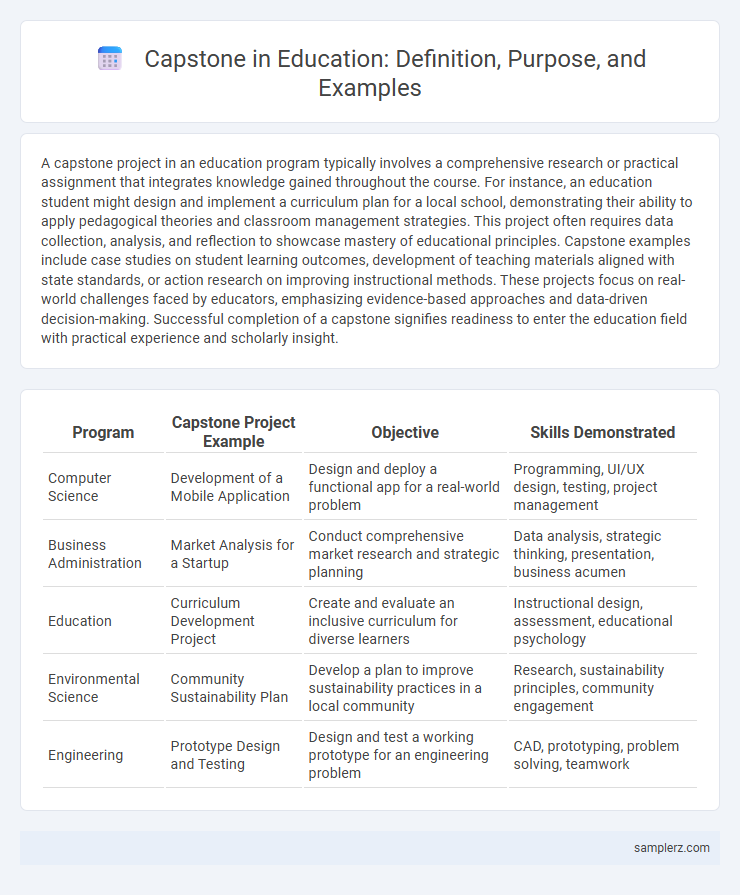A capstone project in an education program typically involves a comprehensive research or practical assignment that integrates knowledge gained throughout the course. For instance, an education student might design and implement a curriculum plan for a local school, demonstrating their ability to apply pedagogical theories and classroom management strategies. This project often requires data collection, analysis, and reflection to showcase mastery of educational principles. Capstone examples include case studies on student learning outcomes, development of teaching materials aligned with state standards, or action research on improving instructional methods. These projects focus on real-world challenges faced by educators, emphasizing evidence-based approaches and data-driven decision-making. Successful completion of a capstone signifies readiness to enter the education field with practical experience and scholarly insight.
Table of Comparison
| Program | Capstone Project Example | Objective | Skills Demonstrated |
|---|---|---|---|
| Computer Science | Development of a Mobile Application | Design and deploy a functional app for a real-world problem | Programming, UI/UX design, testing, project management |
| Business Administration | Market Analysis for a Startup | Conduct comprehensive market research and strategic planning | Data analysis, strategic thinking, presentation, business acumen |
| Education | Curriculum Development Project | Create and evaluate an inclusive curriculum for diverse learners | Instructional design, assessment, educational psychology |
| Environmental Science | Community Sustainability Plan | Develop a plan to improve sustainability practices in a local community | Research, sustainability principles, community engagement |
| Engineering | Prototype Design and Testing | Design and test a working prototype for an engineering problem | CAD, prototyping, problem solving, teamwork |
Innovative Capstone Project Ideas for Education Programs
Innovative capstone projects in education programs include developing adaptive learning apps that use AI to personalize student experiences, creating immersive virtual reality modules for history or science lessons, and designing inclusive curriculum frameworks that address diverse learning needs. These projects often integrate technology with pedagogical theory to enhance engagement and improve educational outcomes. Leveraging data analytics for real-time assessment and feedback also exemplifies cutting-edge capstone work in education innovation.
Real-World Capstone Examples in Teacher Training
Real-world capstone projects in teacher training often involve designing and implementing lesson plans for diverse classroom settings, allowing candidates to apply theoretical knowledge to practical scenarios. Examples include conducting action research on student engagement strategies or developing inclusive curriculum units that address multicultural education. These capstones emphasize critical reflection, classroom management skills, and the integration of educational technology to prepare future educators for dynamic teaching environments.
Successful Capstone Projects: Case Studies in Educational Leadership
Successful capstone projects in educational leadership often involve addressing real-world challenges such as implementing inclusive teaching strategies or developing school-wide leadership frameworks. Case studies highlight initiatives like a district-wide curriculum redesign that improved student engagement by 20% and leadership training programs that enhanced administrative decision-making efficacy. These projects demonstrate practical applications of leadership theories resulting in measurable improvements in school performance and community involvement.
Collaborative Capstone Experiences for Education Majors
Collaborative capstone experiences for education majors involve group projects where students design and implement lesson plans, conduct action research, or develop educational resources addressing real classroom challenges. These projects enhance teamwork, critical thinking, and practical application of pedagogical theories, preparing future educators for diverse learning environments. Emphasizing collaboration in capstones fosters communication skills and reflects authentic teaching scenarios essential for professional growth.
Technology-Focused Capstone Examples in EdTech Programs
Technology-focused capstone projects in EdTech programs often include designing interactive learning platforms that integrate AI to personalize student experiences and improve engagement. Another example involves developing mobile applications that support remote learning through real-time collaboration tools and adaptive assessments. These projects emphasize practical application of software development, instructional design, and user experience principles to address challenges in modern education technology.
Capstone Projects Advancing Inclusive Education Practices
Capstone projects in education programs often focus on advancing inclusive education practices by developing tailored curricula that address diverse learning needs and implementing assistive technologies to support students with disabilities. These projects analyze real-world challenges faced in inclusive classrooms, promoting strategies such as Universal Design for Learning (UDL) and culturally responsive teaching. By integrating research and practical application, capstone initiatives equip future educators with tools to foster equitable learning environments.
Data-Driven Research Capstones in Education
Data-Driven Research Capstones in education programs often involve analyzing large datasets to identify trends in student performance, engagement, and retention. Projects may include evaluating the effectiveness of instructional strategies using standardized test scores or conducting equity audits through demographic data analysis. These capstones equip students with skills in statistical software, data visualization, and evidence-based decision making critical for educational policy development.
Curriculum Design Capstone Examples in Teaching Degrees
Curriculum Design Capstone projects in teaching degrees often involve creating comprehensive lesson plans, unit frameworks, or entire course curricula aligned with state standards and diverse learner needs. Students typically incorporate evidence-based instructional strategies, assessment tools, and technology integration to demonstrate practical application and pedagogical expertise. These capstone examples highlight the synthesis of theoretical knowledge and real-world classroom scenarios essential for effective curriculum development.
Community Engagement Capstone Projects in Education
Community Engagement Capstone Projects in education involve students collaborating with local organizations to address real-world issues such as literacy, environmental awareness, and social inequality. These projects often include service learning components, where students actively participate in community improvement initiatives while applying academic theories. Outcomes of such capstones typically enhance civic responsibility, practical skills, and deeper understanding of societal challenges.
Reflective Practice Capstone Examples for Future Educators
Reflective Practice Capstone examples for future educators often include comprehensive teaching portfolios that document lesson plans, student assessments, and personal reflections on instructional effectiveness. These capstones require candidates to analyze their classroom experiences critically, demonstrating growth in pedagogical strategies and classroom management. Incorporating feedback from mentors and peers, this reflective process fosters continuous improvement and professional development in education programs.

example of capstone in program Infographic
 samplerz.com
samplerz.com